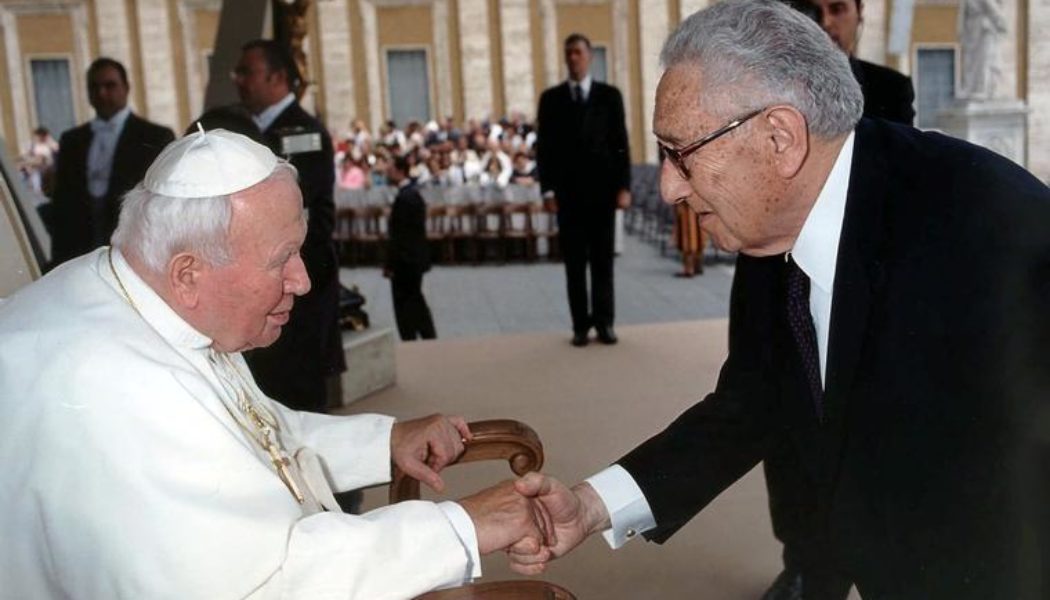
Henry Kissinger was a legend in foreign policy. Whether you see that impact as positive or negative, for better or worse, depends on where you stand on the political spectrum. However, the dividing lines from that era were not as predictable as the polarized lines of left versus right we are witnessing today. To be sure, Kissinger was despised, even vilified, by much of the political left, but he was also a source of friction within the right, with many conservatives disliking him and his policies.
Before considering a few of those lines of separation, it must be said that Kissinger was one of the most influential voices in the history of American foreign policy, particularly in the latter half of the 20th century. In the 1970s, he served Presidents Richard Nixon and Gerald Ford as both secretary of state and national security adviser, at one point holding both positions simultaneously for a time — an unprecedented situation.
In many presidential administrations, the secretary of state and national security adviser have been pitted against one another, with the former the head of the State Department and the nation’s chief diplomat, and the latter tending to be more hawkish on matters of national security. Kissinger juggled both positions with skill and controversy.
Readers of this Catholic publication might wonder if Kissinger’s policies had some type of impact that related particularly to Catholics and their concerns. The answer is absolutely Yes, perhaps even unintentionally. For Kissinger, this happened through the policy of détente, of which he was the proponent and architect through the Republican administrations of Richard Nixon and Gerald Ford. That détente mindset was also picked up by Democratic President Jimmy Carter. It was ultimately rejected by President Ronald Reagan.
During the Cold War, détente was an accommodationist form of foreign policy. That bipartisan 1970s policy — again, of Nixon, Ford and Carter — accepted not only the ongoing existence of the Soviet Union but also the Kremlin’s continued dominance of Eastern Europe. It acquiesced to Soviet control of lands from Eastern Europe to the easternmost regions of the USSR itself.
To Ronald Reagan, this was craven accommodation, pure and simple, “selling down the river” Eastern Europeans, and many others, simply so Uncle Sam could “get along” with those peoples’ masters in the Kremlin. Reagan in October 1964 warned that we should not engage “in a conspiracy of silence and never open our mouths about the millions of people enslaved in the Soviet colonies in the satellite nations.” He candidly stated:
Those who would trade our freedom for the soup kitchen of the welfare state have told us they have a utopian solution of peace without victory. They call their policy “accommodation.” And they say if we’ll only avoid any direct confrontation with the enemy, he’ll forget his evil ways and learn to love us. All who oppose them are indicted as warmongers. They say we offer simple answers to complex problems. Well, perhaps there is a simple answer — not an easy answer, but simple — if you and I have the courage to tell our elected officials that we want our national policy based on what we know in our hearts is morally right.
This policy of accommodation, insisted Reagan — presaging his opposition to the 1970s détente of Kissinger and Nixon and Ford and Carter — was flatly immoral, handing foreign peoples into slavery merely so America could take the easy course of “getting along” with communist despots. It was wrong, said Reagan — a form of surrender, of cowardly appeasement. Sure, it might lead to trade and treaties with the Soviet communists, but at the expense of people in countries like Karol Wojtyła’s Poland and elsewhere in Eastern Europe.
Reagan warned his fellow Americans that they could not gain security and freedom from the threat of the atomic bomb “by committing an immorality so great as saying to a billion human beings now enslaved behind the Iron Curtain, ‘Give up your dreams of freedom because to save our own skins, we’re willing to make a deal with your slave masters.’”
Contrary to the policies and plans of Kissinger and friends, Ronald Reagan would seek to reverse détente. Once elected president in November 1980, he would pursue a policy of liberating the people of Eastern Europe stuck under the jackboot of Soviet communism. This policy of “rollback” was the opposite of what Kissinger had sought. Agreeing with Reagan on this policy was the new Polish pope, John Paul II. And for John Paul, this was likewise a departure from previous policy — that which had been supported by his predecessor, Pope Paul VI.
Along with Cardinal Agostino Casaroli, a careful diplomat, Paul VI pursued a form of Western European-style Ostpolitik, the West German version of détente. They reluctantly but effectively accepted the Cold War division of Europe as the prevailing situation into the far-foreseeable future. Thus, their goal was to try to engage the communist world and work with it for a better, more constructive relationship and improved human rights, including religious freedom. They aimed for diplomacy rather than confrontation; at times, this meant a muting of criticism, or at least a considerable toning down.
Looking back, was this the right policy for the right time? Was it a difficult but necessary historical set-up to the stronger approach of John Paul II, almost exactly like the switch from détente presidents Nixon, Ford and Carter to the anti-détente Ronald Reagan?
In the grander scheme of things, perhaps — though it sure caused quite a stench in the meantime. The men who engaged in this tactic wanted peace, which meant, in their view, stability and status quo. In the assessments of John Paul II and Ronald Reagan, however, stability and the status quo did not equate to peace for the suffering souls behind the Iron Curtain. It may have constituted an absence of hot war and nuclear war, but it was by no means an absence of persecution. It did not lead to liberation for the people of Eastern Europe.
Pope John Paul II’s biographer, George Weigel, notes that the Polish pontiff had never doubted Paul VI’s good intentions with his Ostpolitik, and certainly understood the pontiff’s personal torment, “torn between his heart’s instinct to defend the persecuted Church and his mind’s judgment that he had to pursue the policy of salvare il salvabile (to salvage what is salvageable) — which, as he once put it to his secretary of state, Cardinal Casaroli, wasn’t a ‘policy of glory.’” Salvare il salvabile.
It certainly was not a policy of glory. The decidedly inglorious Ostpolitik and détente entailed significant limitations. Among them, Paul VI’s Ostpolitik undeniably meant occasionally kowtowing to communist demands, or at least giving in and hoping for the better. Like détente, it frequently meant compromise and accommodation. It seemed that the Vatican too often cared more about not offending the Kremlin than vigorously defending religious believers.
As a shameful case in point, in December 1973, Paul VI stripped the 81-year-old Hungarian Cardinal József Mindszenty of his titles. The cardinal suddenly found himself retired from his Church posts as archbishop and primate. The Pontiff declared the Archdiocese of Esztergom officially vacated. The Pope had asked Cardinal Mindszenty to depart his beloved country, as did President Richard Nixon and Secretary of State Henry Kissinger. This was what Moscow wanted, and the West was eager to cozy up to the Kremlin for the purpose of fostering trade, cultural exchanges, treaties, lessened chances of nuclear war, and “peace.”
That was what Henry Kissinger had sought. His policy of détente, pursued in the 1970s, was ultimately the wrong one. To repeat, it arguably might have been okay for the time, in the 1970s, with the two sides trying to get along. But by the 1980s, it was, Ronald Reagan believed, time to win the Cold War, peacefully. Reagan’s policies were a rejection of Kissinger’s, and it was a good thing that they were. In the end, those policies — often supported by Pope John Paul II — ended the Cold War.
John Paul II was with Ronald Reagan on that, not with Henry Kissinger.
Of course, in his very long life — 100 years, to be exact — Henry Kissinger pursued many different policies on a myriad of international issues. Along with President Richard Nixon, he opened China to the West, and he sought to end America’s involvement in Vietnam in a way that made it look like we were not retreating. He was the master of a tough, often Machiavellian “realpolitik.” He was so dominant that students of foreign policy in my generation often referred to him in our class notes as simply “HK.” We knew what that stood for, and what Henry Kissinger stood for.
What Henry Kissinger stood for will be contested and debated for many years still to come. But there is no question that the man left a profound impact on the global stage.









